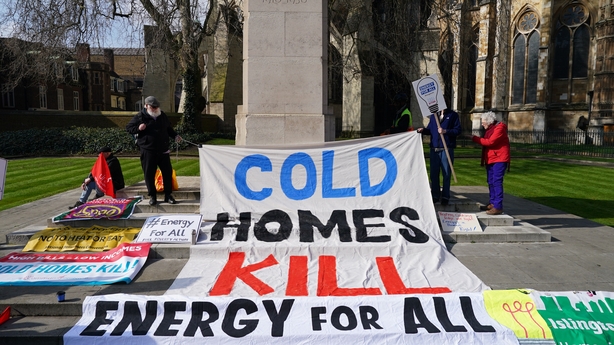British Chancellors of the Exchequer have a habit of making surprise announcements in their budgets.
The media has come to expect what is referred to as a 'rabbit out of the hat'.
However, there was a distinct lack of magic in Jeremy Hunt's speech this year and it turned out that everything had been leaked in advance.
The anti-climactic nature of the 2024 budget prompted commentators to refer to it as a "rabbit-free zone' and 'all hat and no rabbit'.
In particular, there was no cut to income tax which is something that Rishi Sunak's government has long promised and is under pressure from the party's right wing to deliver.
The reason was simple. Britain cannot afford it. The government opted instead for a 2% reduction in National Insurance contributions (equivalent to PRSI) which costs the government about £10 billion in revenue.
A 2% cut to income tax would cost around £14bn.
Like Ireland, Britain operates under self-imposed fiscal rules designed to keep national debt under control.
The Office for Budget Responsibility (OBR) said last November the government had £31bn in 'headroom' but that shrank to £12.8bn before the budget.
It is now down to £8.9bn which is a figure the OBR describes as "historically modest".
There was no wiggle room for tax cuts. The forecasts, as Jeremy Hunt put it, "have gone against us".
Both the International Monetary Fund and the British think tank, the Institute for Fiscal Studies, had warned against income tax cuts.
And Mr Hunt was going to play by the rules. There was no forgetting the turmoil on international markets when then Prime Minister Liz Truss decided to sideline the OBR and go for unfunded tax cuts.
But in all the commentary that followed this year's budget many people seemed to have forgotten about Brexit and its impact on Britain's finances.

The Labour Party leadership is determined not to get involved in an argument about Brexit - something that could alienate potential voters as the election looms.
However, there are some like London Mayor Sadiq Khan who has clashed before with his leader Keir Starmer.
Mr Khan quoted a report from last January which showed that Brexit had cost the UK economy two million jobs and £140bn (€164 billion).
That worked out at £2,000 (€2,350) for each average citizen last year according to the authors, Cambridge Econometrics.
What was more widely accepted was the fact that Mr Hunt had little room for manoeuvre.
The dilapidated state of Britain's local services have again become an issue, and so, Mr Hunt did not announce public spending cuts.
Birmingham City Council - the biggest local authority in Europe - became the latest one in Britain to effectively declare bankruptcy.
It has announced service cuts, redundancies and a 20% rise in council tax, the equivalent of the Local Property Tax.
Mr Hunt announced a public spending increase of 1%, though it has been reported that this will in reality mean cuts for departments other than health, education and defence.
Things became a bit heated on the BBC Radio Four's Today Show on the morning after the budget when presenter Amol Rajan tackled the Chancellor about the state of the country.
Mr Rajan said "this is a country ravaged by economic shocks, at best drifting, at worse, stagnant. We all know about its potential, but we've had seven quarters of falling GDP per head, that’s been revised downwards.
"We’re hooked on foreign labour, the birth rate is collapsing. Many public services are creaking, councils are going bust.
"Those are facts, has your budget really come even close to meeting the scale of the challenges this country faces?"
In response, Mr Hunt replied: "I think the overall characterisation that you’ve just given of the British economy is unworthy of the BBC".
Given the relationship between the Conservatives and the BBC that would have come across as quite a warning.
The Labour Party were better placed to pick apart the budget which contained a number of U-turns, including a major one on 'non dom' tax status.
This tax scheme allowed foreign residents in Britain to pay no tax on income and assets held abroad - something once availed of by Prime Minister Sunak's wife Akshata Murty.

When Labour proposed to abolish Non Dom Status in 2022, Mr Hunt dismissed the idea.
He said this would mean wealthy foreign entrepreneurs moving to Ireland, France, Portugal or Spain which had similar schemes.
Now that the Conservative government is abolishing the non-dom scheme, right wing Tories are angry at the humiliating U-turn.
And they have criticised another budget measure to extend the windfall tax on oil and gas companies.
Again, the windfall tax was another Labour idea which the Conservative government criticised at the time and voted down before then deciding to adopt it.
And in yet another U-turn the British government is bringing in a tax on airplane travel for non-economy seats.
Just last September, Prime Minister Sunak proudly announced he was scrapping a number of green proposals including "new taxes to discourage flying or going on holiday".
Well, there is a flying tax now even if it is purely for revenue generation and not part of Net Zero.
Labour Leader Keir Starmer described the budget's mix of tax rises and tax cuts as the "last desperate act of a party that has failed".
The Resolution Foundation has calculated that those earning between £26,000 (€31,000) and £60,000 (€70,000) will be slightly better off while everyone else will pay more.
The fact that the government is not in a position to cut income tax would suggest it is not in a position to call an early general election in May.
There could be an improvement in the economy that would allow another 'fiscal event' to announce such measures later in the year, possibly in June.
Or the scheme to deport asylum seekers to Rwanda could be up and running.
But at the moment Mr Sunak does not have the 'Hey Presto' achievement that would suggest he is ready to go to the country.







